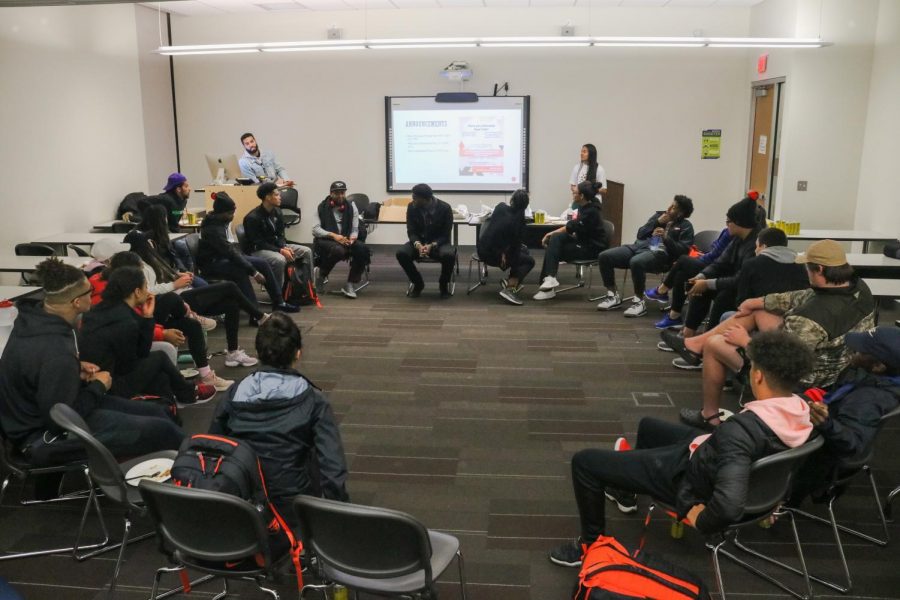‘Real Talk’ off the field
January 7, 2019
Real Talk, a program led by the Student-Athlete Development branch of Oregon State University Athletics, meets bi-weekly and was created to help foster community and create a safe space for minority student-athletes at OSU to share their experiences.
Meetings typically begin with food and mingling among students, and later segway into a designated discussion topic. Oftentimes, a video is shown or a number of powerpoint slides are presented. Then, student-athletes are free to discuss the topic among themselves.
Discussion topics include conversations about race and colorism, political issues like gun control, as well as with lighter topics like new songs or the NBA finals. Yet, one of the most pertinent topics include discussions surrounding the racial injustices which some student-athletes have encountered both at OSU and outside of the university.
Jamaal May, Student-Athlete Development Coordinator, and one of the staff members who facilitates and oversees Real Talk, states that meetings typically average around 30 students in attendance, but says the group has seen up to 60.
“We joke around and say that our student-athletes are just in this bubble in athletics,” May said. “But it’s interesting to hear some of the things that you may not know your teammates are facing or experiencing once they go to class, or once they leave campus. These are real things that are happening, so it’s important that we learn these things in order to become better allies, better teammates and better friends.”
Real Talk initially began as a Diversity and Inclusion Initiative program for minority students specifically, yet the program has since expanded to encompass both minority student-athletes and their allies, in addition to students from the general student population.
Caleb Michael, a fourth-year studying speech communication and former men’s soccer team member, started attending Real Talk when it was first established in fall 2017. He began taking on a leadership role with the group after giving a presentation about Black History Month, and now helps facilitate and lead discussions. He describes his involvement as cathartic, since it allows him to decompress and speak about topics and experiences that may not be discussed otherwise.
“It’s a space where our voices are heard, because a lot of times on a PWI — a predominately white institution — people of color’s voices may not be heard to the same extent of some of their white counterparts,” Michael said. “So having a space like this is important, because people can really express themselves.”
Isis Lowery, a third-year studying digital communication arts and a member of OSU gymnastics, is a regular member of Real Talk. Growing up in Australia and identifying as a mixed person of color, Lowery describes the positive impact her involvement in Real Talk has had, since it has allowed her to connect with other students who have encountered similar struggles.
“I felt like I had to identify as either white or black, and I never felt like I fit in somewhere because I was mixed,” Lowery said. “Being able to go to Real Talk and talk about these things — other people are like, ‘hey, I’ve been there too.’”
Ultimately, May encourages both minority and white students to attend Real Talk, despite the fact that some may feel uncomfortable discussing topics like racism and discrimination, stating that the most growth comes from situations where one feels uncomfortable.
“Some of the conversations, and some of the stories that our student-athletes tell, whether it’s experiences that happened here or experiences happening growing up, they may make you uncomfortable,” May said. “You hear these things, but that’s your teammates’ reality, you know?”
May also emphasized the importance of understanding privilege, and encouraging those who are least affected by racism or discrimination to speak out on the part of the oppressed.
“I think we all have a responsibility when it comes to creating change,” May said.
May was a student-athlete himself, playing football at Georgia State University, and attending graduate school at University of Central Florida prior to taking a position at OSU. He explained how different his experience as a student-athlete was, being in two large cities rather than a college town like Corvallis. He also stated that hearing the experiences of OSU’s minority student-athletes in Real Talk has encouraged him to advocate and strive to create a positive and inclusive atmosphere in athletics as a member of the OSU faculty.
“I believe it furthers my purpose of being out here,” May said. “When you’re in an area where you don’t see that many people that look like you, or you’re part of an underrepresented group, I think it’s good to see someone in my role, and somebody working in this role or helping to lead a group like Real Talk. Because a lot of times, it’s out of sight, out of mind.”
Ultimately, Lowery described the importance of Real Talk to the OSU community, since it allows students to hear a broad range of perspectives and develop new ideas.
“I think the thing I like most about Real Talk is that everyone has something different to say, and we all come from so many different backgrounds and sports,” Lowery said. “It’s just really awesome to hear everyone’s point of view, and I go out of Real Talk every time with a better understanding of certain things.”
May also touched on this point, along with the importance of a group like Real Talk to both the OSU community and society as a whole.
“Some things will never change with society, and we understand that,” May said. “But the better we try to understand each other’s experiences, and why we are the way we are — understand where each other has come from, why we think the way we do, just having conversations — I think that will better impact not only OSU’s campus, but society overall.”











































































































